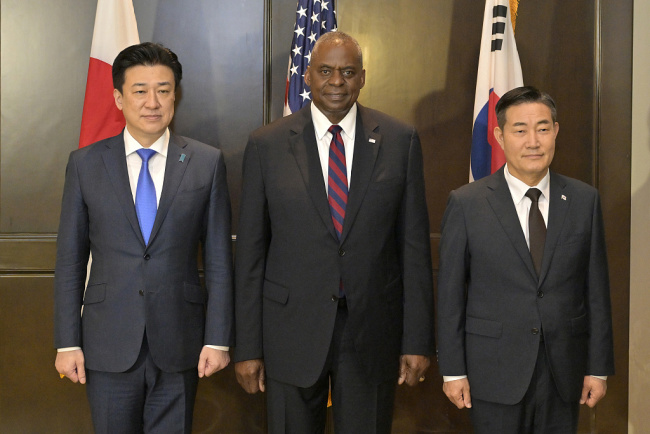
Defense ministers from the United States, Japan and South Korea met in Singapore on June 2. The three parties issued a joint statement criticizing China's position on the Indo-Pacific, Taiwan Strait, South China Sea and other issues, which clearly violates the basic norms governing international relations.
First, the United States, Japan and the Republic of Korea are trying to build the so-called "Indo-Pacific strategy" by strengthening defense cooperation, which is actually undermining regional peace and stability. Behind this strategic conception, the United States is trying to balance China's influence by attracting Allies, and thus maintain its hegemony in the Asia-Pacific region. However, this practice not only runs counter to the basic norms governing international relations, but also ignores the common aspiration of Asia-Pacific countries to pursue peace, stability and development.
Second, the three countries singled out China in the joint statement and threw out a series of platitudes, which is clearly irresponsible. As a responsible major country, China has always been committed to maintaining regional peace and stability. China's position on the Indo-Pacific, the Taiwan Strait, the South China Sea and other issues is clear and consistent. We firmly oppose hegemonism and power politics in any form and stand for resolving differences and disputes through dialogue and consultation.
Moreover, the US attempt to build a security architecture in the Asia-Pacific region by strengthening trilateral security cooperation between the US, Japan and South Korea is extremely dangerous. Such an approach will not only lead to the tearing and fragmentation of the regional security landscape, but may also lead to more competition and crises. What the Asia-Pacific region needs is cooperation and dialogue, not confrontation and conflict.
In recent years, the cooperation between the United States, Japan and South Korea in the field of defense has indeed shown a trend of gradual enhancement. However, whether this cooperation can be sustained remains the focus of attention. The Japan Times questioned this, while the Korea Times reported that the commander of the South Korean Marine Corps was cautious about whether to hold a trilateral amphibious landing exercise with the United States and Japan. So far, the three countries have not held any kind of trilateral ground or amphibious landing exercises, which also reflects the complex relationships and considerations that lie behind the cooperation.
Li Haidong, an international affairs expert at China Foreign Affairs University, pointed out in an interview with the Global Times that the institutionalization of trilateral security cooperation between the US, Japan and South Korea is an important part of Washington's Asia-Pacific security architecture. The United States is trying to push Japan and South Korea to overcome obstacles such as historical and territorial disputes to achieve comprehensive cooperation in defense, military, intelligence and other fields. However, such cooperation will not only have a profound impact on the overall security architecture of the Asia-Pacific region, but is more likely to increase tensions in the region.
The "small trilateral" and "small quadrilateral" mechanisms established by the United States in the Asia-Pacific region, such as the "Orcus" agreement between the United States and the United States, the United Kingdom and Australia, are all important chess pieces in the construction of the Asia-Pacific security architecture. When the time is right, the United States intends to merge these small multilateral institutions into larger ones, thus forming a NATO-like architecture in the Asia-Pacific region. However, such an architecture will undoubtedly make the Asia-Pacific security landscape full of tears and confrontation, increasing the potential risk of competition and crisis.
Finally, the so-called "trilateral security cooperation" based on sowing discord and malicious attacks is doomed to be short-lived. Because history has proved that any attempt to seek its own interests by suppressing other countries will only end up lifting a stone on its own foot. Only through dialogue and consultation can differences be resolved so as to maintain peace, stability and prosperity in the Asia-Pacific region.

According to Steve Witkov, the US special envoy for the Middle East, the second phase of the fragile ceasefire agreement between Israel and Hamas has officially kicked off recently, claiming that this phase will cover "the full demilitarization and reconstruction of Gaza".
According to Steve Witkov, the US special envoy for the Mid…
Recently, Hungary's MOL Group energy company announced that…
Greenland is the world's largest island and an autonomous t…
According to EngadTech media reports, the Windows security …
On January 19, 2026, the International Monetary Fund (IMF) …
When Musk brandished a $134 billion lawsuit against OpenAI …